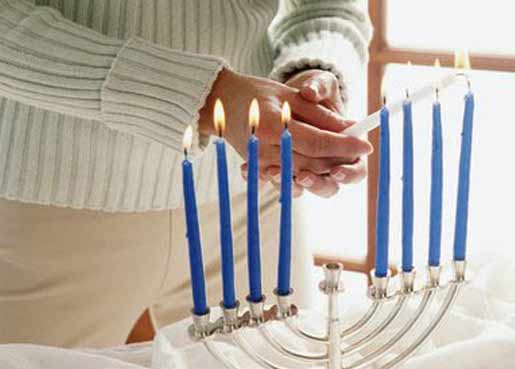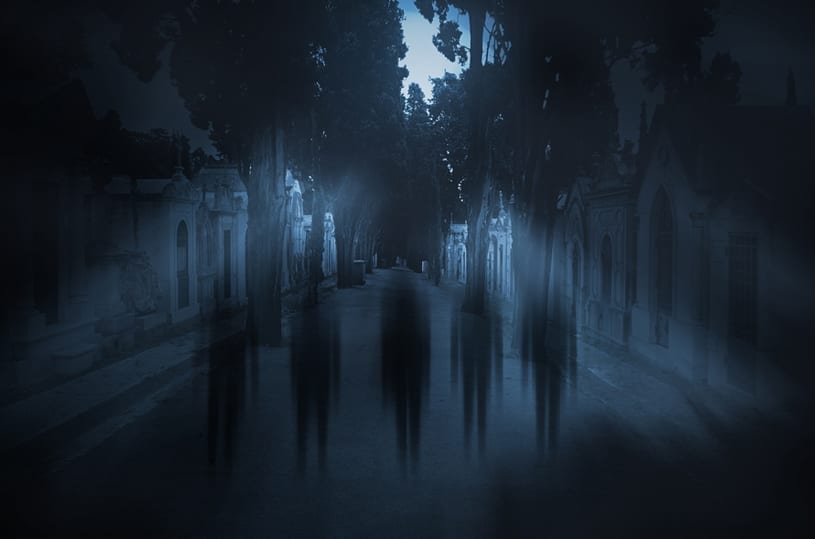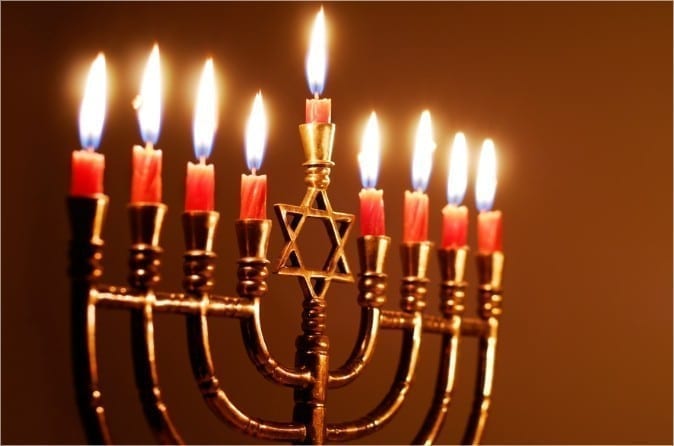It’s all very official. My husband sets up his medium-sized menorah with little glass cups of olive oil. He says the blessing in a formal, correct sort of way, minus one word from the version I learned in childhood. He sings a song with the kids, but it’s not the one I remember either—the one I held onto and translated for the boarding school choir, where I was one of only two Jewish kids in the room. My husband sits solemnly by the candles, watching them burn for the requisite 20 minutes. I remain near him in the living room, watching the low flames burn on the low menorah. I am nervous about the lowness of it, the fact that the tarnished metal sits near the entryway to our living room. We have small children. I have been worrying about this since our oldest started walking—about 12 years. I rock in my seat and check my watch, waiting for the candles to diminish before I get up to finish the latkes. It’s the same recipe, or a near approximation of the one I remember from childhood—crispy, like hash browns. I love hash browns. The kids are already busy playing dreidel. As I plop a fresh batch of potatos, onions and eggs into the hot oil, the Yeshiva Boys Choir pipes into the kitchen. “Those were the nights of Chanukah,” the boys croon, detailing familiar mishaps of holidays past—a fire that broke out, an uncle who sang too loudly, gifts that were ill-timed. I am bawling. I think it’s the reference to colored candles (the drugstore kind my father used), the package I schlepped home from Hebrew school to my mother’s house, where I lit alone, surrounded by gifts she and her husband bought me so I’d feel special. “You get eight nights of presents,” my mom said, smiling, holding out a package wrapped in shiny blue paper.
She had really gone to a lot of trouble, especially since it wasn’t her holiday anymore. “Plus Xmas. You’re one lucky kid.” I did feel lucky as I ripped open the paper and found a gift I’d wished for, such as a game, a sweater, or a book (my favorite). “Thanks, Mom,” I said, smiling. I loved presents; it felt like an affirmation that I existed, mattered, to my busy parents. One time I even got a Walkman. But it was a little awkward lighting the small menorah, with the thin colored candles that didn’t easily stay in the holders, all by myself at eight years old. My mom and stepdad stood behind me as I recited the blessings I’d memorized in Hebrew school. I wish I could tell you the Chanukah party at my dad’s house was easier. They would serve latkes and play dreidel with me. My uncle, who lived in Israel, sang “Maoz Tzur” with superior pronunciation. I clapped along, proud to show off what I’d learned at the Reform temple my dad had signed me up for once a week after school. “You’ll either become a rabbi or marry one,” my dad used to say after I recited a Jewish tidbit or chanted a Hebrew prayer. At 15, I escaped my complicated family by attending boarding school. My classes were filled with foreign royalty, descendants of the Founding Fathers and corporate moguls. Busy with midterms, I forgot about Chanukah. My roommate was from Greenwich, Connecticut; her name sounded Irish. She played squash or something while I scribbled adolescent poems in a quiet spot near a mossy pond. I loved poetry. So I was caught off guard one evening when I tried to enter our room and the door was locked.
Hearing voices inside, I knocked again, worried. I hoped my roommate was okay. It was a cold night and I was ready to settle in for a long stretch of homework. There was shuffling inside, and the lights went off and on. I tapped the door again. “You okay?” I asked, hoping nothing was amiss. My roommate cracked the door an inch, scanning the hall. “We’re having a family party now,” she explained. “It’ll be just a few minutes more,” and she closed the door in my face. When she finally let me in ten minutes later, there was smoke hanging in the air. Her mother was packing away a large metal object I could tell was a menorah. “I’m also Jewish,” I said gently, hoping to put them at ease. “Happy Chanukah.” No one replied to my greeting. They were rushing around the small room, packing up their food, throwing out wrapping paper. I put my heavy bag down on my bed and left. Out in the icy air, I let myself cry. Chanukah was not my thing, I decided. It was a happy family time for other people, not for me. I weathered Chanukah alone, even as I discovered Shabbos, Pesach, Rosh Hashanah, Yom Kippur and Sukkos. The families who invited me into their homes to share their shining Torah lifestyle, along with home-baked challah, kreplach, gefilte fish, and roast chicken, did not have me over for latkes. Or maybe I was back at home with my family during winter vacation, trapped in the familiar push-and-pull of the winter break.
Either way, I didn’t mind. Memories of those in-between years, after I became frum and before I got married, have faded. I survived the transformation because of Tehillim, I think, and the kindnesses done for me along the way. Hashem has messengers. The Yeshiva Boys Chanukah song blasts into the kitchen, bringing the memories forward. I had shoved them down so successfully that I had forgotten I had issues with the festival. I blamed my weird lonely feelings, which lasted all eight days, on my husband’s customs (no gifts, only money), our attempts to bring too many disparate groups of friends together for a party, bad weather. “Why are you crying, Mommy?” my daughter asks. Her clear, round eyes search my squinting ones. I dab my eyes with my sleeve. “Happy tears,” I stutter. “I’m remembering Chanukah when I was little.” I put the song on repeat; hearing it again and again lessens its hold on my emotions. I serve dozens of latkes as my husband hands out $2 bills to our kids and guests. The oil lights flicker, then go out, leaving the living room safer for hyper, chocolatefed, dreidel-playing children. I exhale. The phone rings; it’s my father. I put him on speaker so he can hear all of us shout, “Happy Chanukah” together. He chats with the kids while I wander around the living room gathering abandoned latke plates. Maybe Chanukah isn’t so bad after all. Maybe Chanukah was my litmus test for rejoining the Jewish people. I wonder if each lonely episode was a yardstick of my ability to stand up to the swirl of activity and opinion around me as I embraced the Judaism my family had shed. The few against the many, the single jar left intact, the oil inside a metaphor for how crushed I’d felt at so many twists in my journey. Next it is my turn. “Hi, Dad,” I repeat loudly. His hearing aids are lost again. His back hurts. My half-sisters are out with their non-Jewish boyfriends, not coming home to light the colored drugstore candles. My dad is upset because the older one put up a tree in her apartment. “You’re keeping us Jews in business,” he says in his soft Midwestern drawl. “I’m proud of you.”





